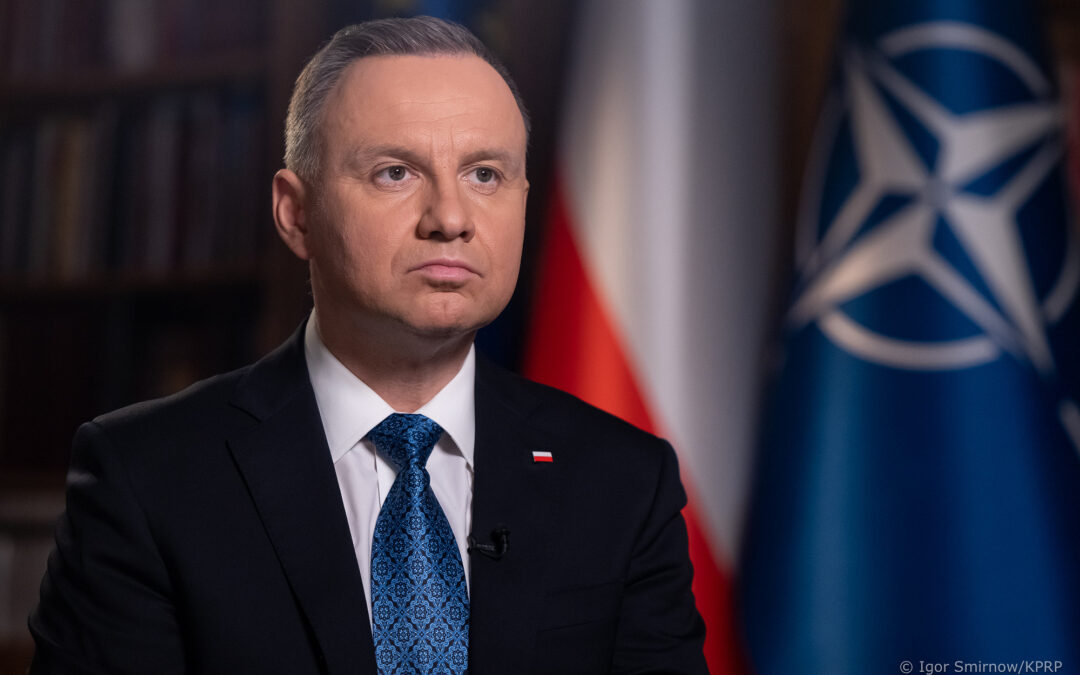Keep our news free from ads and paywalls by making a donation to support our work!

Notes from Poland is run by a small editorial team and is published by an independent, non-profit foundation that is funded through donations from our readers. We cannot do what we do without your support.
President Andrzej Duda has said that if there continues to be “madness among judges” in Poland, a “cleansing” could be necessary. He then cited a man who had told him that a return to hanging traitors would discourage such actions, with Duda saying “there is truth in these words”.
The president was speaking during an interview with media outlets Otwarta Konserwa, Klub Jagielloński and Nowy Ład. Among the issues he addressed was the longstanding and deeply contested question of judicial reform.
🗣️ @prezydentpl @AndrzejDuda: Jeżeli to środowisko nie opamięta się, to trzeba będzie tych wszystkich ludzi wyrzucić ze stanu sędziowskiego bez prawa do stanu spoczynku. (…) Niedawno jeden człowiek powiedział do mnie bardzo brutalnie: "Wie Pan dlaczego w Polsce jest tyle… pic.twitter.com/3HTEhszovY
— Otwarta Konserwa (@OKonserwa) July 9, 2025
Duda claimed that, for around three decades after the fall of communism, constitutional court judges were chosen by “post-communists or leftist liberals”, making it “impossible to push anything through”.
Only in 2015, when the national-conservative Law and Justice (PiS) party came to power, did “normal, honest and reliable changes” to the judiciary begin, said the president. However, “suddenly the Constitutional Tribunal was being questioned because the entire furious establishment was contesting these changes”.
A visibly angry Duda then declared that “if this [judicial] community doesn’t come to its senses and reset itself, it will end up with all these people being dismissed from the judicial system, without the right to retire…A cleansing will be necessary. These people have proven over the years that they are unfit to be judges”.
“Recently, a man said to me very brutally: ‘Do you know why there is so much treason and brazen squabbling in Poland? Because it’s been a long time since anyone was hanged for treason,'” recounted the president. “It’s terrible, but there’s truth in those words…Punishment also has a deterrent effect.”
The president’s words prompted a response from foreign minister Radosław Sikorski, who wrote on X: “I kindly inform President Andrzej Duda that…Poland has been bound since 2000 by protocol no. 6 to the Council of Europe Convention for the Protection of Human Rights, which abolished the death penalty.”
Duda and PiS have long argued that Poland did not truly gain freedom in 1989, and that instead a group of “post-communists” retained power in politics, the judiciary, media, business and other key sectors.
In 2020, Duda said that it was necessary to “cleanse Poland of all kinds of dirt that was introduced by that [communist] era…replacing them with new tissue”.
Critics of PiS and Duda have noted, however, that they have themselves installed former communists into prominent positions, such as Stanisław Piotrowicz, a former communist prosecutor who served as a PiS MP before being appointed by Duda as a constitutional court judge.
"We are still cleansing Poland of all kinds of dirt," said President Duda in an interview with Catholic broadcaster @RadioMaryja as he bids for reelection.
"Certain elements must be removed, replacing them with new tissue." https://t.co/IPwEVXEAXX
— Notes from Poland 🇵🇱 (@notesfrompoland) June 2, 2020
Opinion polling also shows that most Poles believe the judicial reforms introduced by PiS and Duda between 2015 and 2023 were intended simply to exert political control over courts rather than improve their functioning.
Since PiS lost power in 2023, the new government, led by Prime Minister Donald Tusk, has sought to “depoliticise” the judiciary and restore legitimacy to the courts. However, it has found its plans blocked by Duda.
The president’s second and final term in office ends next month. He will be replaced by PiS-backed President-elect Karol Nawrocki, who is also likely to oppose the government’s efforts at judicial reform.
Fifteen months since the change of government, Poland's rule-of-law crisis continues – indeed, many Poles think the situation has got worse.@J_Jaraczewski explains the roots of the crisis, what its impact has been, and how it might be resolved https://t.co/7KOCURV3dU
— Notes from Poland 🇵🇱 (@notesfrompoland) March 17, 2025

Notes from Poland is run by a small editorial team and published by an independent, non-profit foundation that is funded through donations from our readers. We cannot do what we do without your support.
Main image credit: Igor Smirnow/KPRP

Daniel Tilles is editor-in-chief of Notes from Poland. He has written on Polish affairs for a wide range of publications, including Foreign Policy, POLITICO Europe, EUobserver and Dziennik Gazeta Prawna.



















